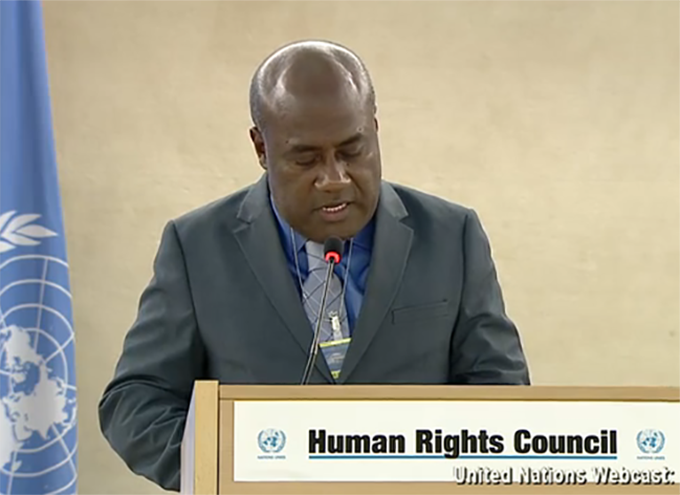A Vanuatu cabinet minister has delivered a stinging condemnation of Indonesia over the “grave situation” on human rights violations in West Papua.
Ronald K Warsal, Minister of Justice and Community Development, speaking on behalf of a coalition of seven Pacific countries – Palau, Marshall Islands, Nauru, Solomon Islands, Tonga, Tuvalu and Vanuatu – made the criticisms in a speech to the UN Human Rights Council yesterday.
He spoke of Indonesian state violence, including reports of extrajudicial executions of activists, arrests, beatings and fatal shootings of peaceful demonstrators, and persistent violence against Papuan women.
Warsal called on the council to request the High Commissioner to produce a consolidated report on the situation in West Papua.
Indonesia, speaking in a right of reply, denied the allegations, saying that they did not reflect the situation in Papua.
As a democracy based on the rule of law, Indonesia said, it always investigated allegations of human rights violations and delivered justice, and it promoted the rights of its people in Papua.
Vanuatu should not politicise the issue of Papua for its domestic political purposes, Indonesia said
The full statement by Ronald K Warsal, MP and Minister of Justice and Community Development, Republic of Vanuatu
34th Session of the UN Human Rights Council
Geneva, Switzerland, 1 March 2017
Mr President
Excellencies, Distinguished Delegates Ladies and Gentlemen.
The Republic of Vanuatu is very pleased to address this meeting.
Today, I am speaking on behalf of both Vanuatu and six other nations of our Pacific region: Tonga, Nauru, Palau, Tuvalu, the Marshall Islands, and the Solomon Islands
Mr President, we seven have come together today and in a separate written joint statement in order to draw the attention of the distinguished members of the UN Human Rights Council to the grave situation in West Papua.
Mr President, specifically, we focus your attention on a number of recent pronouncements by mandate holders of this Council about serious Indonesian violations of the human rights of indigenous Papuans:
The recent joint letter issued by the UN Special Rapporteur on the promotion and protection of the right to freedom of opinion and expression; the Special Rapporteur on the rights to freedom of peaceful assembly and of association; the Special Rapporteur on the rights of indigenous peoples; the Special Rapporteur on extrajudicial, summary or arbitrary executions; and the Special Rapporteur on torture and other cruel, inhuman or degrading treatment or punishment.
We also draw attention to other accounts of Indonesian state violence in West Papua, including: communications from the UN Committee on the Elimination of Racial Discrimination, referring to killings and arrests of Papuans; numerous well-documented reports of extrajudicial executions of activists and the arrests, beatings and fatal shootings of peaceful demonstrators, including high school students; and reports of persistent violence against Papuan women.
We note that in the last 15 years the Indonesian National Commission on Human Rights has collected evidence of gross human rights violations by Indonesian security forces in three principal areas of West Papua: Wasior, Wamena, and Paniai. The Commission has described the sets of cases in the first two places as crimes against humanity, which are punishable under Indonesian and international laws.
We want further to highlight another broad aspect of human rights violations the Indonesian government policy over many decades and continuing until today of the migration of non-indigenous Papuans to West Papua, leading to a dramatic decline in the percentage of the indigenous Papuan population.
Mr President, to date, the government of Indonesia has, however, not been able to curtail or halt these various and widespread violations. Neither has that government been able to deliver justice for the victims. Nor has there been any noticeable action to address these violations by the Indonesian government, which has, of course, immediate responsibility and primary accountability.
Furthermore, the Indonesian government has consistently been unable to submit the required periodic human right reports and reviews, which are an essential international norm by which the United Nations secretariat and member states monitor human rights around the world. These written assessments are critical to identifying and eradicating torture, racial discrimination and human rights violations generally.
Mr President, in light of these violations and the Indonesian government’s inaction, we call on the UN Human Rights Council to request the High Commissioner for Human Rights to produce a consolidated report on the actual situation in West Papua.
The High Commissioner’s report needs to take account of the information in existing Treaties, Special Procedures, and the Universal Periodic Review, as well as reports from other international and regional organizations and non-governmental organisations.
The report should also detail the various rights under the International Bill of Human Rights and the related conventions, including the right to self-determination.
And the report must make recommendations for immediate action to halt the pattern of human rights violations as attested to by the numerous Special Procedures and other bodies noted earlier.
Finally, we ask for full and unreserved cooperation with the High Commissioner in the fulfilment of this mandate, including provision by Indonesian authorities of complete access to any persons in West Papua deemed appropriate to meet in the compilation of this report.
Mr President, as I close, we believe that challenges of West Papua must be brought back to the agenda of the United Nations.
Thank you once again for the opportunity to express my views in this forum. Long God Yumi Stanap. In God we stand. Thank you.














































